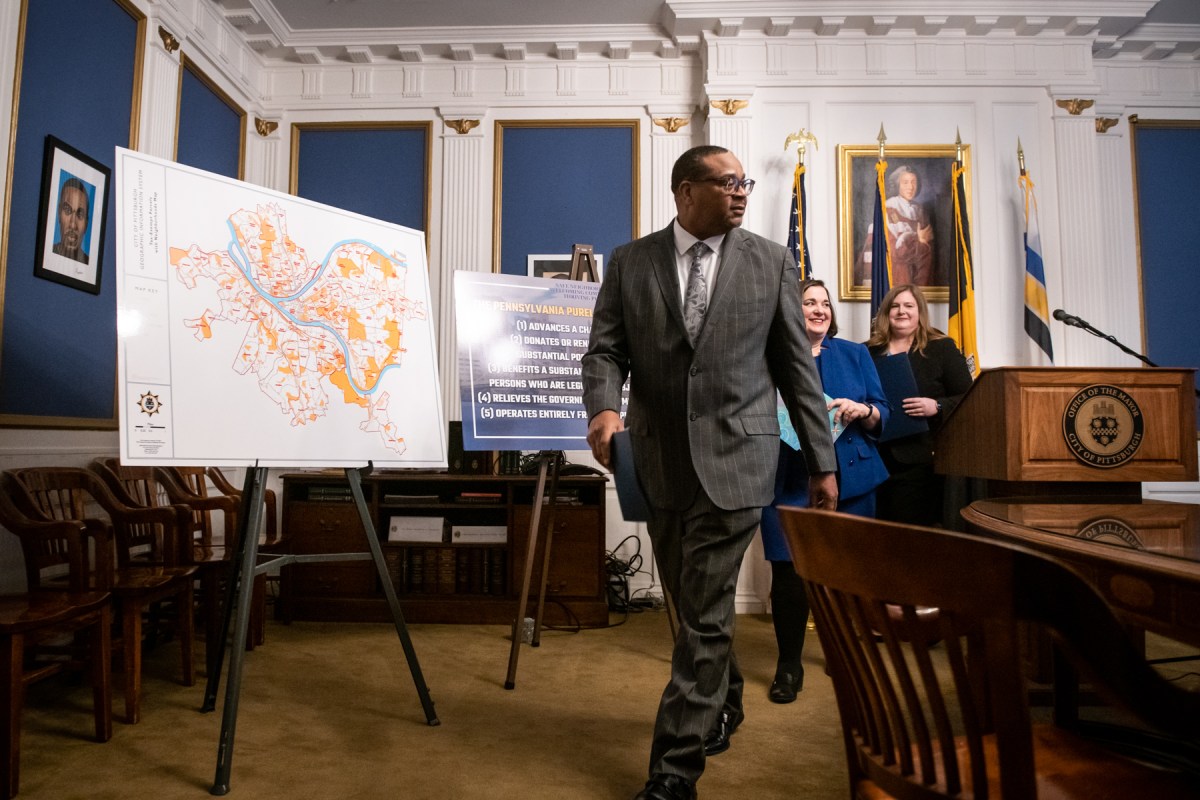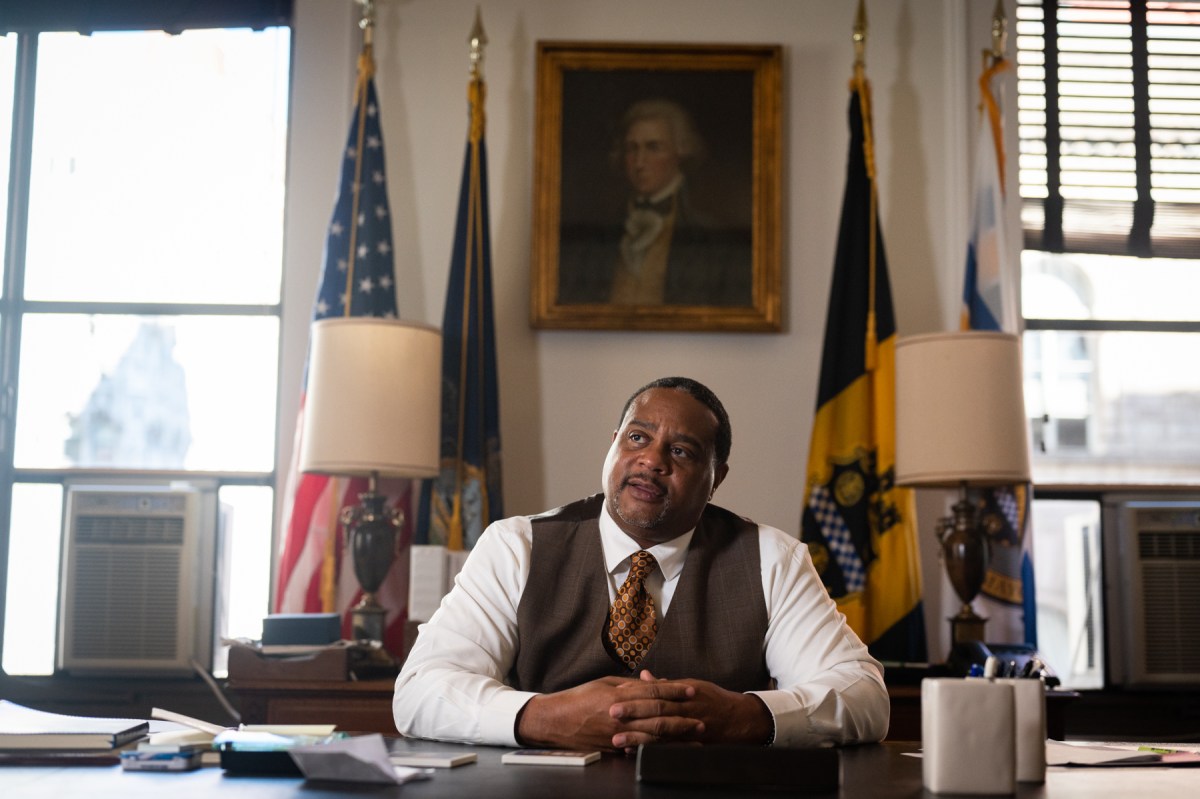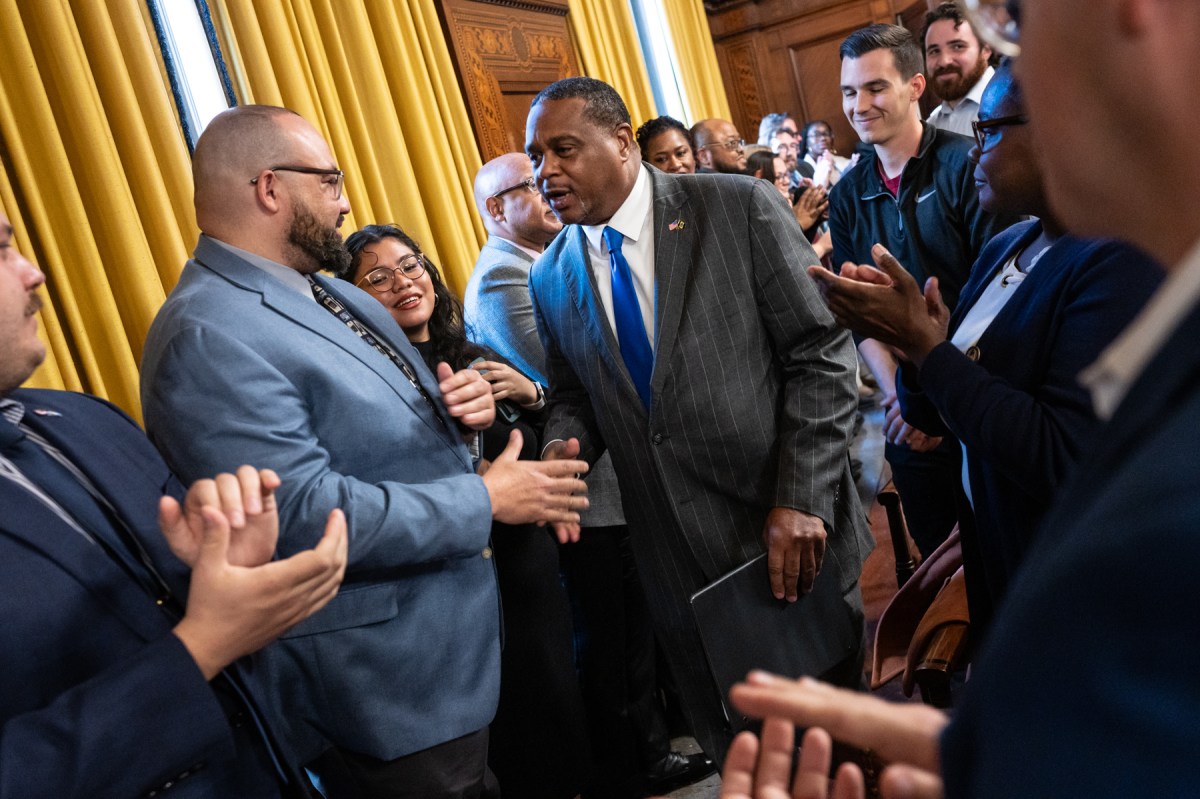Pittsburgh’s budget is set to tighten and its rainy day fund will dwindle in the next several years while the city collects less than half a million dollars per year in voluntary payments from major nonprofits.
Meanwhile Providence, Rhode Island this fall came to a 20-year agreement with local colleges that brings the city an average of more than $11 million per year, safeguarding the city’s finances and preserving good relations between municipal government and major institutions.
The agreement for payments in lieu of taxes, known as a PILOT, could serve as a model for Pittsburgh to pursue as it seeks greater contributions from nonprofit giants like UPMC, the University of Pittsburgh and others. But doing so would require a change of course: Pittsburgh Mayor Ed Gainey has taken a far more confrontational and fragmented approach than his Rhode Island counterparts.
Providence’s approach, centered around a group negotiation with all the involved colleges and a give and take of benefits, netted the city $59 per resident annually, on average. Pittsburgh’s proposed 2024 budget, by contrast, includes $1.44 per resident revenue from nonprofits’ voluntary payments.
Pittsburgh’s meager results are not for a lack of desire: Mayors have tried to raise revenue from nonprofits for decades. Gainey made the issue a centerpiece of his 2021 run for office, covering the campaign trail with promises to make UPMC “pay their fair share” to the city. But two years into his term, he has little to show for it.
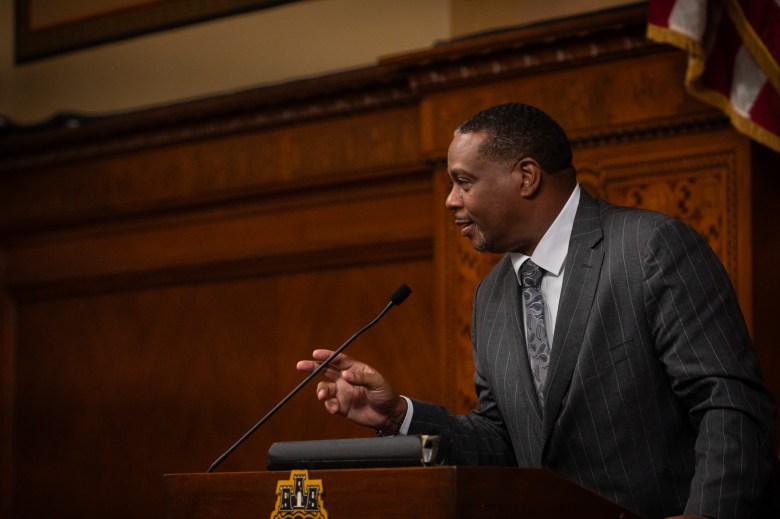
How did Providence achieve what Pittsburgh seemingly can’t? Interviews with leaders in both cities show drastically different approaches, with collaboration and transparency winning the day in Rhode Island.
Pittsburgh battles, Providence sought consensus
Gainey has met infrequently with nonprofit leaders and has spoken in combative terms about legal challenges he is bringing to certain nonprofit-owned properties’ tax exempt status.
Gainey’s move is the latest in decades of tries by Pittsburgh mayors to reap more money from nonprofits. Former Mayor Tom Murphy created a fund which saw the city’s PILOT contributions temporarily increase to $17 per capita. Former Mayor Luke Ravenstahl sued UPMC to try to revoke its nonprofit status. Former Mayor Bill Peduto nixed that lawsuit and created his own PILOT-like initiative, called OnePGH, which was scrapped when Gainey took office.
Police reform, nonprofit payments on Gainey’s list as mid-term approaches
Providence’s mayor took a collaborative-but-determined approach to working with four colleges to get a deal.
“You get more with honey than with vinegar,” said Dan Egan, president of the Association of Independent Colleges and Universities of Rhode Island, who negotiated with the City of Providence. “I think it’s appropriate to ask for money, but it’s appropriate to ask for it in partnership, not in the sense that it’s owed, per se.”
Egan and Providence College administrator John Sweeney both said that Providence Mayor Brett Smiley took a fair, even-handed approach to the negotiations.
“Mayor Smiley was very committed to working with the colleges rather than working against them,” Sweeney said. “It was not adversarial, although he was quite clear that this is something he was committed to. He said the city has an interest in the colleges and universities succeeding. That set a good environment.”
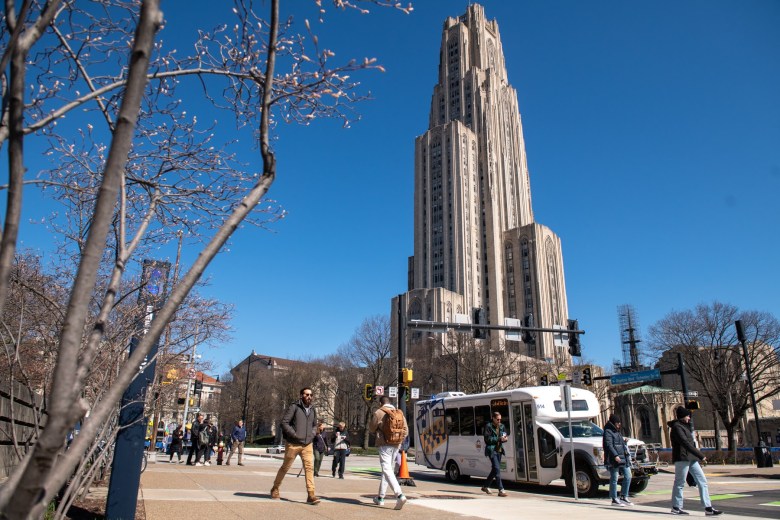
Gainey ran for office in 2021 with an aggressive tone toward UPMC; one of the priorities on his campaign website reads “Demanding that UPMC pay their fair share.” It’s unclear if Gainey has pursued a broad, cooperative agreement like the Providence deal. His office declined to comment for this story and he has declined in the past to comment on any closed-door meetings with leaders of UPMC and Highmark.
Gainey’s most significant move to date was announcing legal challenges to the tax-exempt status of 26 properties owned by Pittsburgh nonprofits, including some owned by UPMC. He told PublicSource in an October interview that he plans to ramp that effort up considerably in 2024.
Gainey’s budget shows lean years ahead, with cuts to paving and shrinking reserves
Some officials in Pittsburgh are doubting Gainey’s combative approach to the problem. City Councilor Anthony Coghill, who will find himself among the most tenured council members come January, said Gainey’s legal fight has dashed any hope of a substantive voluntary agreement with universities or hospitals.
“What I disagree with is our posturing, trying to force their hand,” Coghill said. “In my opinion it’s going to go nowhere …
“Sit them down and say ‘forget about this lawsuit nonsense, let’s talk about a PILOT. People are rushed to your facilities in our ambulances and using our roadways, and we need financial help.’”
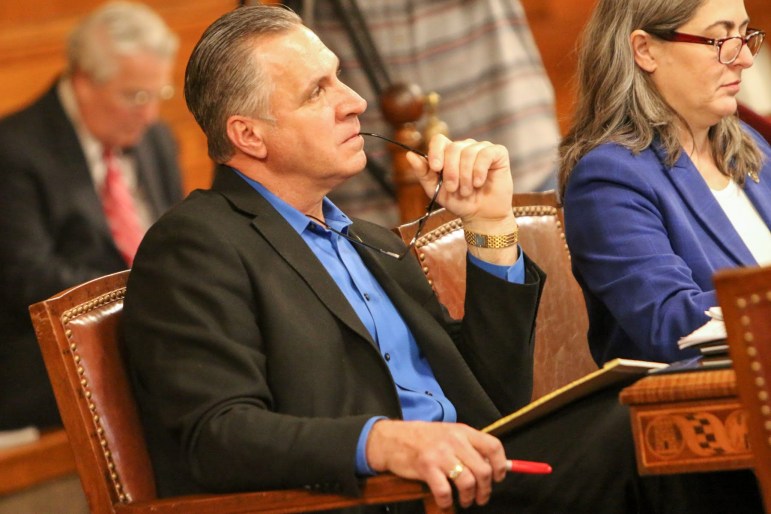
City Controller-elect Rachael Heisler, who takes office in January and served as deputy controller since 2021, said she, too, disagrees with Gainey’s tactics.
“If you start that conversation with litigation, I don’t know that you’ll have any willing participants,” Heisler said. “The approach of suing hasn’t worked.”
A ‘fair’ process, with no singling out
Both college leaders and city leaders in Providence said it was key to negotiate with the four major nonprofits as a group, not individually. Smiley got negotiators from Brown University, Providence College, Johnson & Wales University and Rhode Island School of Design at the same table from the start.
“In some ways they had to negotiate amongst themselves, and the city wasn’t a party to that,” said Courtney Hawkins, the chief operating officer under Smiley. “I think it would have taken much longer” to make agreements with institutions individually.
Egan said the collective approach can reassure individual institutions that they are not going to end up paying disproportionately more than others.
“If nonprofits should pay, it should be fair among nonprofits,” Egan said. “What’s fair about two institutions or two sectors paying? Where’s the fairness of that?”
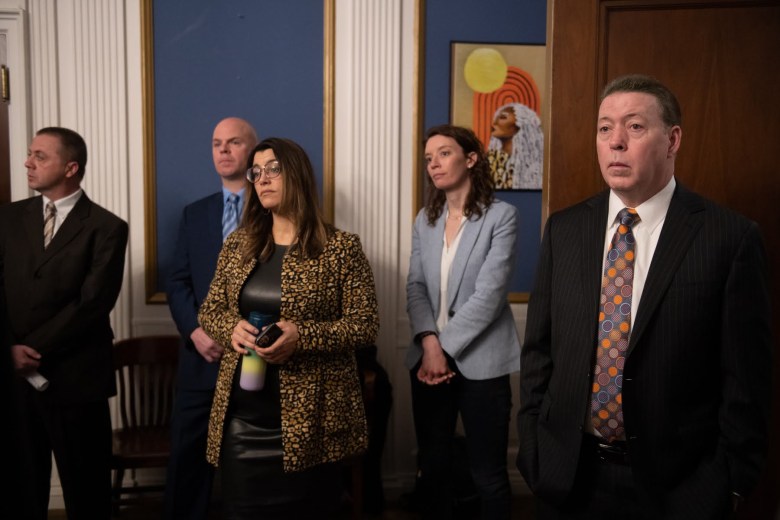
While Gainey’s recent legal efforts don’t officially focus on UPMC, the healthcare conglomerate was the target of most of the mayor’s campaign rhetoric. He said during an October interview partly about UPMC that the city’s legal efforts to tax nonprofit property will ramp up in 2024.
Asked if UPMC would be open to a broad agreement like the one in Providence, UPMC spokesperson Paul Wood wrote in an email to PublicSource that the city “can count on [UPMC’s] full participation in programs that are fair and equitable and include the region’s other major nonprofits.”
Heisler, drawing on a report her office produced in 2022, suggested the city start with the “big five” nonprofits — UPMC, AHN/Highmark, the University of Pittsburgh, Carnegie Mellon University and Duquesne University. Of the five, only UPMC responded to PublicSource’s requests for comment.
The five together own city property with a taxable value of $4.3 billion, which, without the exemptions, would bring the city around $34 million in annual taxes.
Hawkins, the Providence COO, said the city was careful to avoid language and proposals that would make the nonprofit institutions uncomfortable. The phrase “fair share” was not tossed around, and the institutions’ tax exempt status was never called into question. Smiley also made sure to give the universities credit for their economic impact on the city.
“It certainly helped that they knew he would give them credit where it was due, and it wasn’t a one-sided conversation,” Hawkins said.
Pittsburgh short on cash
If Pittsburgh were to receive $59 per capita annually in new PILOT agreements — the average amount Providence will receive over the next 20 years — that would work out to $17.6 million per year on average.
That’s a significant sum for a city facing lean budget years, a shrinking rainy day fund and the end of federal COVID-19 relief money. Pittsburgh projects an operating margin of just $3.5 million in 2025 — its lowest in years — while its rainy day fund is set to decrease to the legal minimum by 2028.
“I think [PILOT] revenue is essential to city government,” Heisler said, nodding to the gloomy budget forecast for the next five years. “If [the mayor’s office] is not having these conversations, they need to be. They owe it to the people who live here. Because there is going to be no budget flexibility at all in the next few years. You need to have some wiggle room.”
Charlie Wolfson is PublicSource’s local government reporter and a Report for America corps member. He can be reached at charlie@publicsource.org.
This story was fact-checked by Lucas Dufalla.

